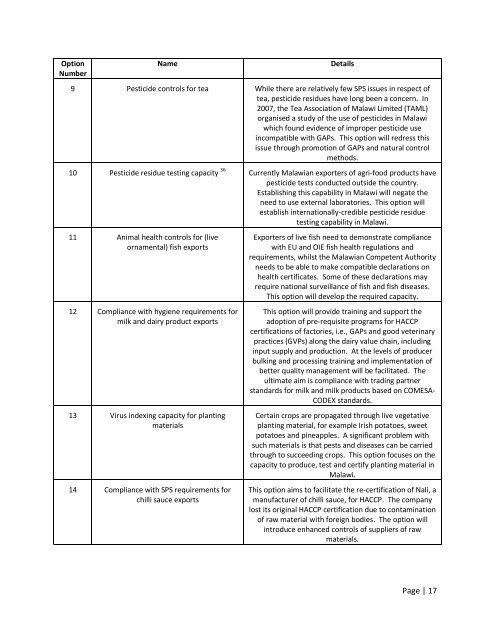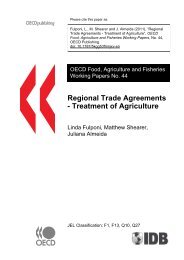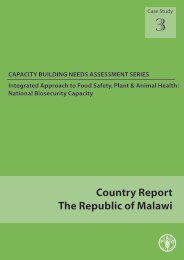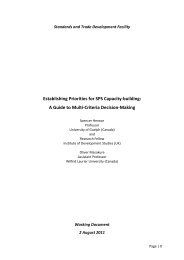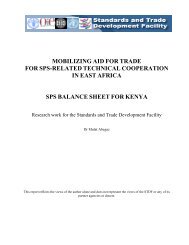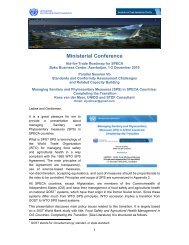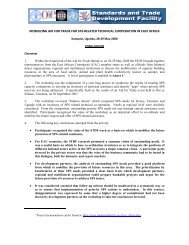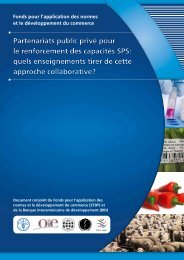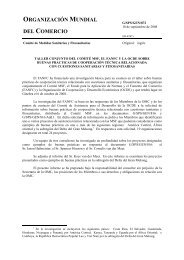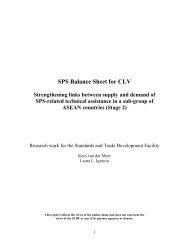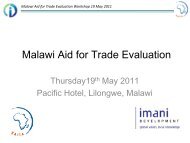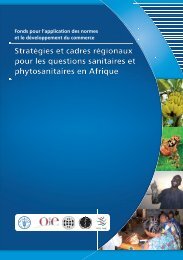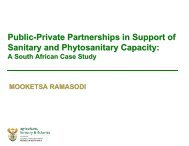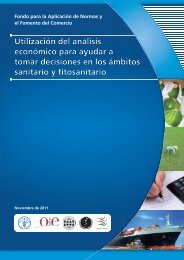MCDA Final Report Malawi - Standards and Trade Development ...
MCDA Final Report Malawi - Standards and Trade Development ...
MCDA Final Report Malawi - Standards and Trade Development ...
You also want an ePaper? Increase the reach of your titles
YUMPU automatically turns print PDFs into web optimized ePapers that Google loves.
Option<br />
Number<br />
Name<br />
Details<br />
9 Pesticide controls for tea While there are relatively few SPS issues in respect of<br />
tea, pesticide residues have long been a concern. In<br />
2007, the Tea Association of <strong>Malawi</strong> Limited (TAML)<br />
organised a study of the use of pesticides in <strong>Malawi</strong><br />
which found evidence of improper pesticide use<br />
incompatible with GAPs. This option will redress this<br />
issue through promotion of GAPs <strong>and</strong> natural control<br />
methods.<br />
10 Pesticide residue testing capacity 36 Currently <strong>Malawi</strong>an exporters of agri-food products have<br />
pesticide tests conducted outside the country.<br />
Establishing this capability in <strong>Malawi</strong> will negate the<br />
need to use external laboratories. This option will<br />
establish internationally-credible pesticide residue<br />
testing capability in <strong>Malawi</strong>.<br />
11 Animal health controls for (live<br />
ornamental) fish exports<br />
12 Compliance with hygiene requirements for<br />
milk <strong>and</strong> dairy product exports<br />
13 Virus indexing capacity for planting<br />
materials<br />
14 Compliance with SPS requirements for<br />
chilli sauce exports<br />
Exporters of live fish need to demonstrate compliance<br />
with EU <strong>and</strong> OIE fish health regulations <strong>and</strong><br />
requirements, whilst the <strong>Malawi</strong>an Competent Authority<br />
needs to be able to make compatible declarations on<br />
health certificates. Some of these declarations may<br />
require national surveillance of fish <strong>and</strong> fish diseases.<br />
This option will develop the required capacity.<br />
This option will provide training <strong>and</strong> support the<br />
adoption of pre-requisite programs for HACCP<br />
certifications of factories, i.e., GAPs <strong>and</strong> good veterinary<br />
practices (GVPs) along the dairy value chain, including<br />
input supply <strong>and</strong> production. At the levels of producer<br />
bulking <strong>and</strong> processing training <strong>and</strong> implementation of<br />
better quality management will be facilitated. The<br />
ultimate aim is compliance with trading partner<br />
st<strong>and</strong>ards for milk <strong>and</strong> milk products based on COMESA-<br />
CODEX st<strong>and</strong>ards.<br />
Certain crops are propagated through live vegetative<br />
planting material, for example Irish potatoes, sweet<br />
potatoes <strong>and</strong> pineapples. A significant problem with<br />
such materials is that pests <strong>and</strong> diseases can be carried<br />
through to succeeding crops. This option focuses on the<br />
capacity to produce, test <strong>and</strong> certify planting material in<br />
<strong>Malawi</strong>.<br />
This option aims to facilitate the re-certification of Nali, a<br />
manufacturer of chilli sauce, for HACCP. The company<br />
lost its original HACCP certification due to contamination<br />
of raw material with foreign bodies. The option will<br />
introduce enhanced controls of suppliers of raw<br />
materials.<br />
Page | 17


